597 Search Results for tell me about it
July 25, 2012
by Carole Zangari -
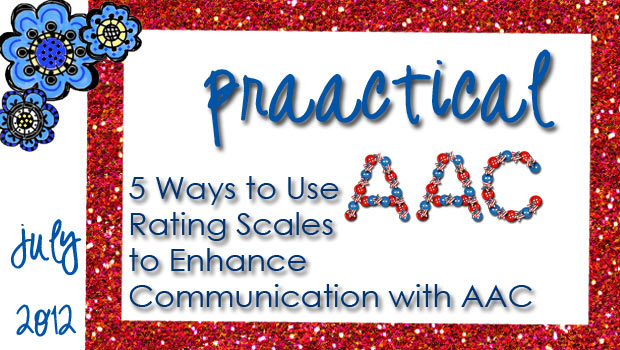
In an earlier post, we lamented the under-utilization of a quick and effective strategy: qualitative rating scales. You may not know them by that name, but we all know them. Also called Likert-type scales, we’ve seen these a multitude of times when we were asked to give an opinion. Strongly agree to Strongly Disagree. Excellent to Poor. Always to Never. – There are only a few guidelines to using these with AAC folks. One is to make sure to use appropriate visual supports. Literate AAC users may be very comfortable with text-only options, but for other learners, we need to add images so it makes sense to them. Another suggestion is to stick with an odd number of options: 5 seems to be the norm in clinical practice, but you can certainly adjust to fit the learner’s needs. For some, a 3-point scale would be best. Others may want more... [Read More...]
July 18, 2012
by Carole Zangari -
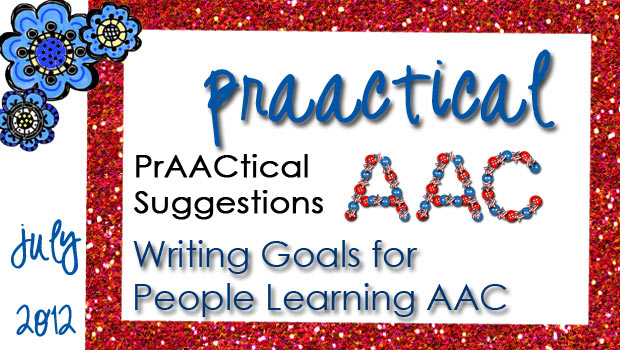
This post was inspired by a budding young professional who loves AAC and is DETERMINED to provide best practice services for the young students she serves. (See?? This is why we love being clinical educators!) We were chatting about a youngster on her caseload who uses an eyegaze SGD and is making some good progress with the technical aspects of it. Our conversation turned to goal setting. – First, a word about how to talk about AAC in the goals and objectives. For people who use SGDs, there are pros and cons to naming the actual device in the goal. Some SLPs favor that, while others prefer a more flexible approach and describe the device features. More about that another time. A more general concern about writing AAC goals is the tendency to focus more on operating equipment than on becoming an effective communicator. Clearly, we advocate the latter: AAC... [Read More...]
July 15, 2012
by Robin Parker -
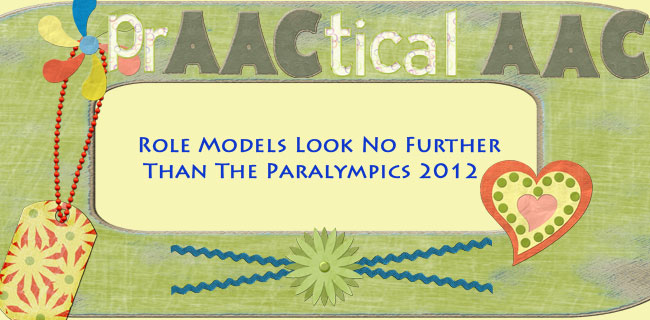
Have you met Mandeville and Wenlock? Think Paralympics and Olympics. These mascots were created by Grant Hunter in collaboration with children. They were made with children in mind to help encourage participation in Paralympic and Olympic sports. We love that Mandeville and Wenlock are encouraging ALL children to aspire to be world-class athletes. Not only are the Olympics a big deal (See our Olympic PrAACtical AAC perspective), but the Paralympics are also a big deal. Paralympic Althletes impress most everyone and provide an opportunity for children with disabilities ALL over the world, to have role models who might look or sound like them. We love it when everyone can be inspired together. The Summer Paralympics will take place in London, England, in 2012, from August 29 through September 9. They will be the biggest Paralympic Games ever featuring 4,200 athletes from 160 countries who will compete in 20 sports. These... [Read More...]
July 14, 2012
by Robin Parker -
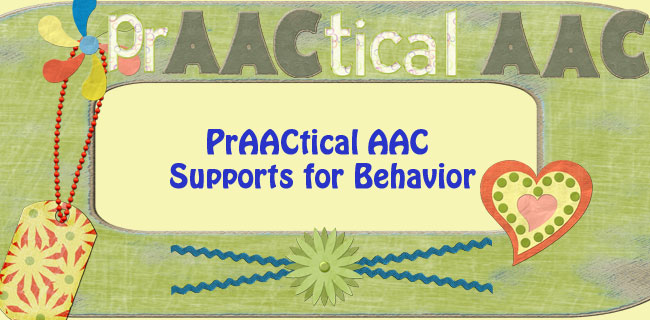
Our July Strategy of the Month, PrAActical AAC Supports for Behavior, is a favorite topic for us, because with a little planning, we can adhere to the old adage that an ‘ounce of prevention is worth a pound of cure’ (as Carole said last week). We also find that behavior challenges are often one of the main reasons, our students (and colleagues) get stressed about working with children with significant communication impairments. And since stress for ANYONE does not make for an optimal learning environment, we love to show how effective preventative strategies work. This week we are focusing on ‘setting the stage’ for conventional and appropriate behavior by engineering the physical environment. We are talking about more than keeping the room neat, clean, and generally organized. We are talking about arranging the physical environment in a planned and careful way in order can make a huge difference in helping... [Read More...]
July 7, 2012
by Carole Zangari -
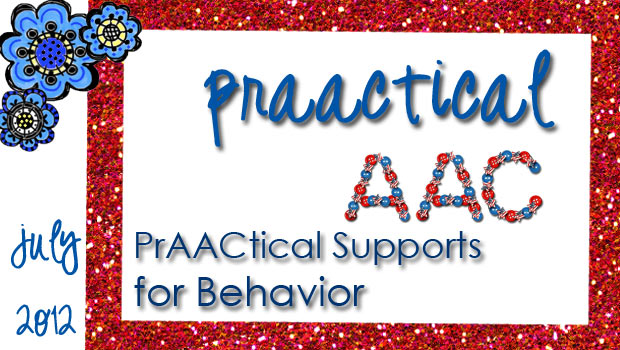
Rachel arrives to therapy tense and upset. Mauro gets frustrated when the clinician presents new activities. Brianna starts to bang the table when demands are placed on her. Zach becomes agitated when he has to wait for something he wants. – Like any set of tools and strategies, AAC works best when the communicator is relaxed, confident, and engaged. Our July Strategy of the Month focuses on PrAACtical Supports for Behavior. We hope to share ideas for planning therapy sessions that help AAC learners stay focused, calm, and engaged. — We’re big believers in the old adage that an ounce of prevention is worth a pound of cure. So, what can we do to prevent or minimize problems like the ones experienced by Rachel, Mauro, Brianna, and Zach? The answers have to do with having clear and appropriate expectations, and using visual and AAC supports effectively. When used consistently, these strategies... [Read More...]
June 30, 2012
by Carole Zangari -

– “It may be conceded to the mathematicians that four is twice two. But two is not twice one. Two is two thousand times one.” (G.K. Chesterton, 1908) 1 budding blog 2 clinical educators 6 months of blogging 200+ posts 26,000+ page views – Numbers don’t always tell the whole story, or even the right one, but in this case, they’ll do just fine. – When we started this process in January, we had only a vague idea of what shape our blog would take. We only knew that the ‘old ways’ of sharing information weren’t having the impact we were looking for. We’ve had a great time learning about the blogosphere and now it’s time to celebrate! – Here in Florida, we can easily do that with another beach retreat, a lovely bottle of wine, and some relaxing al fresco dining. But we wanted to include you in the celebration... [Read More...]
June 24, 2012
by Carole Zangari -
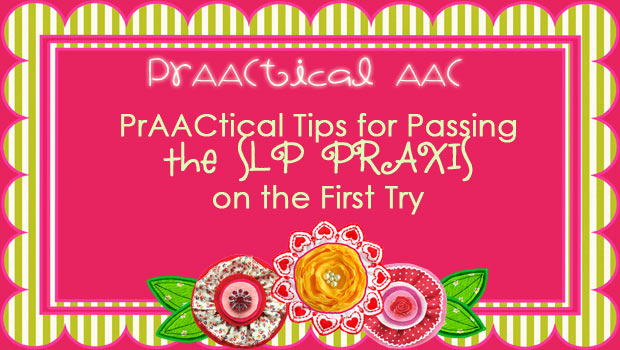
In today’s post, we’re taking a big detour. For the next few weeks, some of our Sunday posts will deviate a bit from the world of AAC, AT, and disability and plunge into the world of the graduate student SLP. Every job has ‘other duties as assigned’ and part of mine involves helping our graduate students get ready for the SLP PRAXIS exam. At our university, we’ve had a structured review class offered online for almost 10 years and I’ve had the pleasure of being involved with that during its evolution. I frequently get requests from students at other universities to take the class, which we can’t accommodate, and it finally (!) occurred to me to write a blog post with some tips and suggestions. The result is this 3-part series. So…Let’s get this party started! –– Before You Start to Study – 1. Learn about the SLP PRAXIS exam... [Read More...]
June 18, 2012
by Robin Parker -
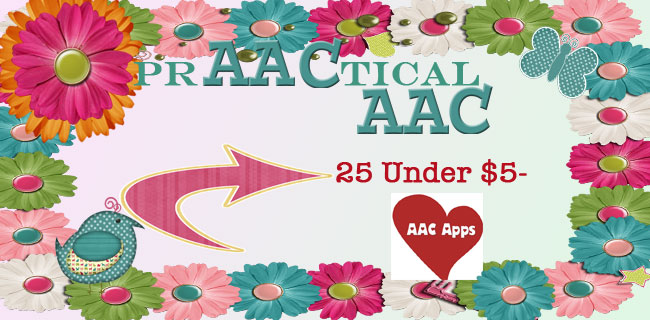
We are now up to 72 Free or Lite version of AAC apps. There is another emerging price point category of apps that are not quite free but fairly close. We were so happy to find 25 apps under $5.oo. These are all regular versions. All the same teaching and preparation is needed when choosing AAC apps, no shortcuts here, but deciding if you need an app for ‘small talk’ or telling stories or labeling may help make it easier to decide which AAC apps to try. The RelAAAC rubric may help with these decisions after a feature match process is done. After selecting the AAC app, then comes the fun part. You can be creative by setting up fun opportunities to communicate. Communication temptations can be set up for requesting (putting favorite toys in a closed screw top jar) and commenting (wearing really big fun hats/glasses). And don’t forget... [Read More...]
June 16, 2012
by Carole Zangari -
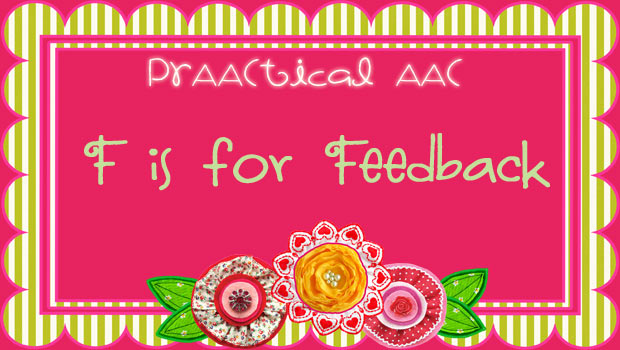
This month we’ve been talking about ways to use traditional language facilitation strategies with people who use AAC. So far, we’ve covered expansion and extensions and recasts. This week we talk about feedback. Feedback is a critical component of any learning experience. It functions as a signpost and let’s us know where we are relative to our destination. Let’s think about how we can use it to improve the language of people who use AAC. – Contingent Responses What we do and say after the AAC learner communicates can be a powerful way to impact patterns of language use. The cardinal rule in AAC intervention is to provide consequences that are contingent on what was communicated. So, if the beginning AAC learner requested a something they don’t really like by mistake, we’d still provide that item and have them interact with it briefly before giving them a chance to make a different choice.... [Read More...]
June 15, 2012
by Carole Zangari -
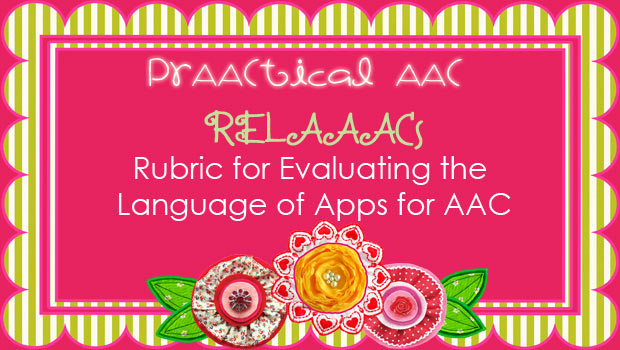
It is not the strongest of the species that survive, nor the most intelligent, but the one most responsive to change. Charles Darwin – SLPs everywhere are struggling with the game-changing explosion of AAC apps on mobile devices. We’ve mentioned our own internal conflict in previous posts and continue to mull over how best to integrate this into our work as clinical educators without jeopardizing the assessment and intervention principles that have served us so well over the years. We’ve really appreciated the fine work of professionals such as Jessica Gosnell at Boston Children’s Hospital, Scott Marfilius, and Kelly Fonner, and have put their feature match checklists to good use. As we did, we found that we wanted a more systematic way to consider the language and communication of the AAC apps that we were learning about. – This post introduces you to an early draft of RELAAACs: Rubric for Evaluating the... [Read More...]









